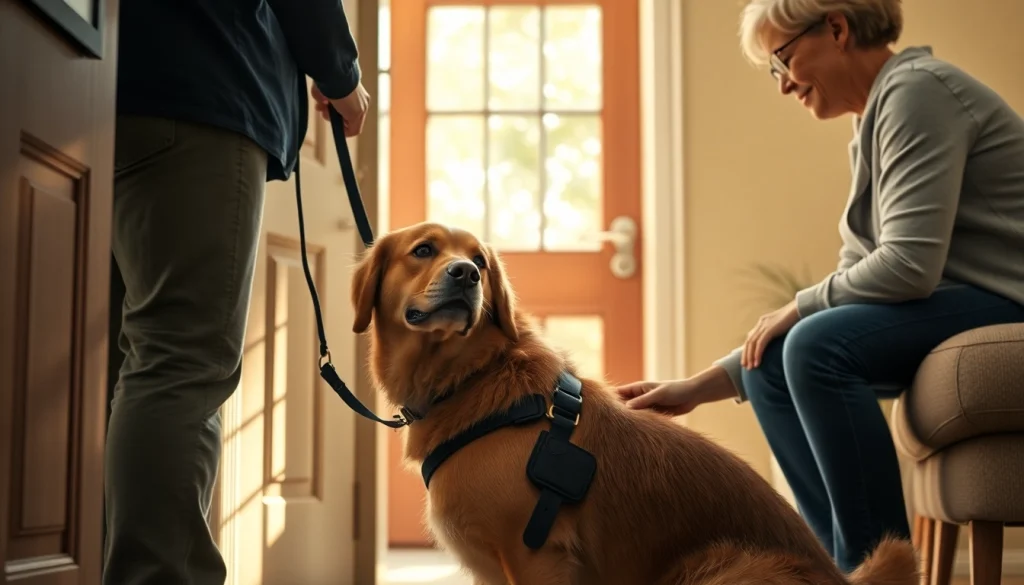What are Service Dogs?
Definition and Purpose of Service Dogs
Service dogs are specially trained animals tasked with assisting individuals who have disabilities. These disabilities can range from physical limitations to psychiatric conditions, highlighting the importance of service dogs in improving their handlers’ quality of life. Unlike regular pets, service dogs undergo rigorous training to perform specific tasks directly related to their owners’ needs, such as guiding visually impaired individuals or providing mobility assistance to those with physical impairments.
Types of Service Dogs
There are various types of service dogs, each trained for unique tasks that aid individuals based on their specific disabilities. The main categories include:
- Guide Dogs: Specifically trained to assist individuals with vision impairments by navigating obstacles and enhancing mobility.
- Mobility Assistance Dogs: These dogs help individuals with physical disabilities perform daily tasks such as retrieving items, opening doors, and providing balance support.
- Medical Alert Dogs: Trained to detect conditions like diabetes, seizures, or allergy attacks, these dogs alert their owners or others to potential medical issues.
- Psychiatric Service Dogs: Designed to support individuals with mental health conditions such as PTSD, anxiety, or severe depression by providing comfort and performing tasks like grounding.
Legal Protections for Service Dogs
In the United States, service dogs are protected under the Americans with Disabilities Act (ADA). This law stipulates that service dogs are allowed to accompany their handlers in public places, including restaurants, hotels, and stores, without discrimination. However, it is important to note that the ADA does not recognize emotional support animals as service dogs, underscoring the unique training and tasks that service dogs fulfill.
Benefits of Service Dogs
Enhancing Independence and Confidence
The presence of a service dog often significantly increases the independence of individuals with disabilities. By assisting with everyday tasks, service dogs empower their handlers to navigate the world with greater confidence, knowing that they have reliable support by their side.
Improving Mental Health and Wellbeing
Research has shown that interacting with service dogs can enhance mental health by reducing anxiety and depression levels. The bond formed between a handler and their service dog provides emotional stability and companionship that can be life-changing for those battling mental health issues.
Facilitating Daily Activities
Service dogs are trained to perform specific tasks that directly assist their handlers in daily life. This may include basic tasks like picking up dropped items, opening doors, or even alerting others in case of an emergency. By facilitating these activities, service dogs not only provide practical help but also foster a sense of normalcy and routine for their owners.
Training and Certification of Service Dogs
Essential Skills and Tasks
A service dog undergoes extensive training that can last anywhere from several months to two years, depending on the complexity of the needed tasks. Essential skills might include:
- Guiding around obstacles for visually impaired handlers.
- Retrieving items from various locations.
- Alerting to urgent medical conditions or changes in their handler’s health.
- Providing mobility support for those with physical impairments.
Understanding Training Programs
Various training programs exist for service dogs, some of which may be specific to certain organizations. These programs ensure high standards of training and are often tailored to meet the needs of specific disabilities. Training usually involves a combination of basic obedience, task-specific training, and socialization to ensure that each dog can perform effectively in a variety of environments.
Certification Requirements
While the ADA does not enforce specific certification requirements for service dogs, reputable training programs will provide some form of certification or documentation verifying that the animal has completed a recognized training program. This can be beneficial in situations where a handler’s rights may be questioned.
Choosing the Right Service Dog
Factors to Consider
When choosing a service dog, potential handlers should consider their specific needs, the type of disability, and the tasks that the dog will need to perform. Additionally, factors such as breed characteristics, temperament, and energy levels are critical in ensuring a good match between the dog and the handler.
Finding a Reputable Trainer
Finding a qualified trainer is crucial in acquiring a service dog. Handlers should conduct thorough research and ask for recommendations. Look for programs accredited by recognized organizations, as these are likely to adhere to higher standards of training and ethics.
Long-term Commitment and Care
Owning a service dog requires a long-term commitment both to the dog and to ongoing training. Handlers need to be prepared for the responsibilities associated with daily care, veterinary visits, and the continuous reinforcement of training. This commitment is vital for ensuring the dog remains effective in its role over time.
Resources for Service Dog Handlers
Support Groups and Communities
Connecting with support groups and communities can provide invaluable resources for service dog handlers, including emotional support, training tips, and advice on navigating various challenges. Many organizations and online platforms offer networks for sharing experiences and tips with fellow handlers.
Legal Resources and Advocacy
Knowledge of legal rights is essential for service dog handlers. Various advocacy organizations provide resources regarding the rights of handlers and service dogs under the ADA and can assist with legal issues related to access. These resources can be critical in addressing discrimination and ensuring compliance with laws.
Ongoing Training and Education
Service dog training does not end after the initial certification. Ongoing education for both the handler and dog is imperative to maintain skills and adapt to changing circumstances. Many organizations offer continuing education courses, which can be beneficial for handlers looking to enhance their skills and their dog’s performance.
You may also like
-
Find Your Perfect Maine Coon Cats for Sale Near Me: A Guide to Adopting Your Feline Companion
-
Charming Maine Coon Kittens for Sale in Oakland: Find Your Perfect Companion
-
Nutrition Redefined: Understanding badlands ranch superfood complete for Your Dog
-
Choosing the Best Badlands Ranch Dog Food Canada for Your Pooch’s Health
-
Finding the Perfect PTSD Service Dog for Sale: Your Guide to Support and Healing
